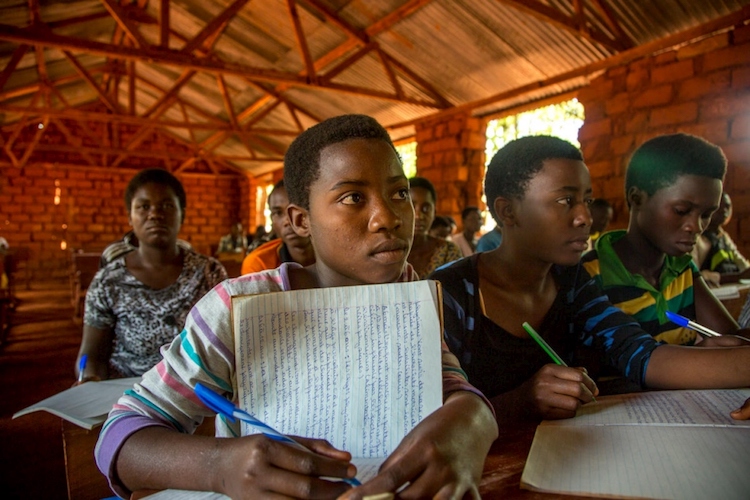
Viewpoint by Idriss Jazairy
Ambassador Idriss Jazairy is the executive director of the Geneva Centre for Human Rights Advancement and Global Dialogue and the former head of a UN specialised agency, IFAD. This article first appeared* in EURACTIV on February 5, 2018 and is being re-published with their permission.
GENEVA (IDN) – More people than ever are on the move under the centrifugal impulse of globalisation. Fifteen percent of the world’s population or one billion of the Earth’s seven billion people are considered as people on the move. Host developing countries or societies bear the brunt of those that flee from their homes.
There are 740 million internally displaced people. On top of this, the world is home to 244 million international migrants and 22.5 million refugees. The world has thus never witnessed a more complex and massive movement of people since the end of the Second World War.
Yet, attempts to deny the inevitability of global human mobility and to demonize globalization until recently hailed as an expression of “the magic of the market”, are the preferred responses to the protracted migrant and refugee crisis.
On-going armed conflict and indiscriminate terrorist attacks in their wake as well as climate change have brought bereavement principally to the Middle East and the North Africa (MENA) region and are spilling over to other regions including Europe.
This has given rise to an exacerbation of human rights violations in societies in the MENA region. More than 10 million people in Syria, Sudan, Iraq, and Yemen have been forcibly displaced from their home societies or countries owing to the rise of extremist violence and to water scarcity.
Thousands of refugees and migrants undertake perilous and treacherous journeys in a desperate search for a better and a safer future. Only a small proportion of these goes to destination countries that are advanced and prosperous societies and who champion human rights and democracy.
Yet this is where the backlash is now occurring. Thus, the aspirations of “huddled masses” for a safer and better life remain in limbo as multilateralism and consensus building are being challenged by unilateralism, populism and political adventurism.
Extremism and populism are being mainstreamed in the rich world. Eastern Europe is threatening the democratic traditions of a continent referred to as the birthplace of democracy. The electoral outcomes in numerous European countries illustrate that populist parties are emerging as credible political actors.
Although the displaced only account for 0.2% of Europe’s population, short-term perceptions of national interests and fearmongering together with an outburst of identity politics downgrade human rights and specifically the need to respond to the plight of people on the move.
How can one overcome these challenges that threaten to destabilize peace and stability in the world?
On 14 December 2017, a coalition of civil society organizations and specialists adopted the 2017 Geneva Declaration entitled “Mobility and human solidarity, a challenge and an opportunity for Europe and the MENA region.” This declaration was signed by representatives of 12 organizations worldwide who were driven by the idea that the migrant and refugee crisis can be addressed through dialogue and joint action.
To achieve this noble goal, the Geneva Declaration calls upon international decision-makers to uphold the view that global human mobility can become the driving force of social progress. It appeals to decision-makers in the Arab region and the West to identify equitable burden- and responsibility-sharing mechanisms to provide protection to people on the move.
Lebanon, Jordan, and Turkey host displaced people that may add up to 25%, 20% and 3% of these countries’ populations respectively. The burden has thus been put on poorer countries to deal with a complex situation that is not of their doing.
Attempts in prosperous societies to “fortify” and seal off borders exacerbate the plight of these people on the move. It contributes to the criminalization of migrants and refugees.
The Declaration echoes the need to enhance the fairness of responsibility-sharing mechanisms for hosting displaced, mostly young, people guided by the principles of international solidarity, justice and, why not acknowledge it, of long-term self-interest of host countries where the proportion of the elderly keeps increasing. This is an occasion for all to keep alive the lofty aims of the 1951 Convention relating to the Status of Refugees.
A key outcome of the Declaration is the joint call to action to establish a Global Charter to enhance the protection of the rights of people on the move.
The refugee and migrant crisis has ceased to be rational and is being caught up in an emotional whirlwind. The Global Charter should caution the EU against “externalising” or “outsourcing” compassion to people on the move or envisioning the situation merely as a security and border control issue.
European officials must consider global human mobility as a human right, and not just as an issue of protection. Nor should selective compassion and selective mercy for people on the move be allowed to prevail. A multilateral task force should be put in place to coordinate the implementation of the Global Compact for Migration, the Global Compact on Refugees and hopefully the future Global Charter.
Global human mobility must not be considered as an obstacle to the social progress of societies. Societies that demonstrate respect for human dignity are the ones most likely to be winners in the long run.
There is a need for courageous European leadership and broad-based support from the media to “depoliticise” the issue of refugees and migrants and to free public opinion from the irrational fear that has gripped it in this regard. [IDN-InDepthNews – 08 February 2018]
*The original article with the headline ‘Adapting to global human mobility after a refugee and migrant crisis’ appeared with the link: https://www.euractiv.com/section/global-europe/opinion/adapting-to-global-human-mobility-after-a-refugee-and-migrant-crisis/
Photo: Burundian student Mmane Alini, 17, takes notes in class at Hope Secondary School in Nduta refugee camp, Tanzania. © UNHCR/Georgina Goodwin
IDN is flagship agency of the International Press Syndicate.
facebook.com/IDN.GoingDeeper – twitter.com/InDepthNews











